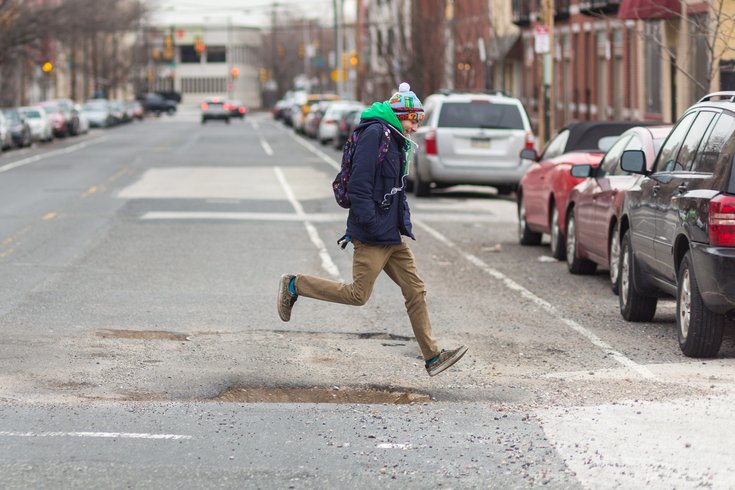
May 15, 2018
 Thom Carroll/PhillyVoice
Thom Carroll/PhillyVoice
A pedestrian jumps over a large pothole on Fairmount Avenue. Mayor Jim Kenney's 2019 budget proposal includes millions earmarked to improve and repair the city's roadways.
We're going to have to find something new to complain about soon.
The Philadelphia Streets Department has officially declared it paving season in the city — and not a moment too soon for some residents. A slew of roads are slated to get filled in South Philly this week.
You can check if your block is on the Streets Department’s radar this season here.
Work will be completed between 7 a.m. and 4 p.m. throughout the summer, and even into the fall.
And all of this means parking restrictions, too. Temporary "No Parking" signs will be posted in advance of each street paving. There's a good chance you'll get towed if you ignore these signs.
Virginia resident drives 450 miles to get a cheesesteak at John's Roast Pork in South Philly. Loves the sandwich, hates all the potholes. Left with an accurate, albeit incomplete, representation of Philly. https://t.co/y7KlOruvQQ
— John Kopp (@WriterJohnKopp) March 30, 2018
@PhillyStreets Are milk crates, buckets, and traffic cones official pothole repair items now? 1200 block of 13th St, just South of Federal. It's been like this for weeks now. @philly311 #philly #potholes pic.twitter.com/4UmQOqlOle
— kevinmogee (@kevinmogee) April 30, 2018
This all got me thinking about why we get potholes to begin with and why this time of year is notoriously pothole-ridden.
So here is a quick-hit explanation: When it rains or snows, that water seeps into the roadways through cracks in the asphalt. Vehicles passing over it force the water into the now soggy roadways, and it erodes over time.
Asphalt then sinks into the eroded parts, and chunks start coming off. So, it’s not rocket science, but it’s still a nuisance.
Here’s a more detailed explanation. But you get the picture.
The potholes in south philly will have your whole car in a ditch
— nina toscano (@ninatoscano) April 18, 2018
Dodging potholes in the streets of south philly is an Olympic sport
— Jules (@Julianaascafidi) March 30, 2018
During the paving process, a conventional paving method is used to mill off
the top asphalt surface, prepare and repair utility manhole covers and any
roadway base areas. Then a new asphalt top surface is applied, according to the Streets Department’s paving announcement.
This paving process will take about three to five weeks, and then they’ll add traffic lines. Expect this until November.
@PhillyMayor will our streets ever get paved? Already had two tires replaced. I mean I understand a few days or even a week but now we are going on 3 weeks! This is worse than the freaking potholes! #Disgrace #potholes
— Jessica Tursi (@jessicaturs) April 27, 2018